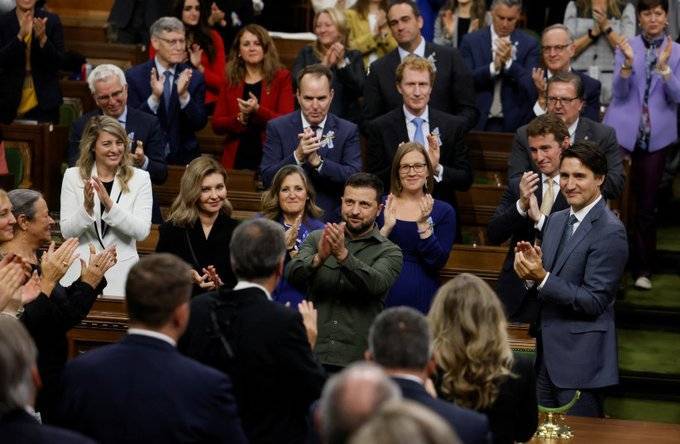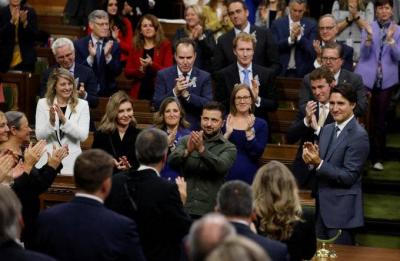Canadian Prime Minister Justin Trudeau issued an apology on Wednesday after the former Speaker of the House of Commons praised a Nazi veteran during a session attended by Ukrainian President Volodymyr Zelensky. Trudeau told reporters, "This was a mistake that greatly embarrassed Parliament and Canada," stating he would soon address the House of Commons to offer an official apology for what occurred.
Poland has entered the fray regarding the honor given to the Ukrainian Nazi in the Canadian Parliament, following tense relations between Kiev and Warsaw over Poland's ban on Ukrainian food products. Polish Ambassador to Canada Witold Dzielski confirmed that his country expects an apology regarding the tribute to Ukrainian nationalist veteran Yaroslav Hunka, who served in the SS. The Polish diplomat emphasized, "The leadership of Canada and Ukraine praised members of the SS 'Galicia' Division in the House of Commons on September 22, a notorious Ukrainian military formation from World War II responsible for the deaths of thousands of Poles and Jews." He reiterated that "Poland, as Ukraine's best ally, will never accept attempts to whitewash the reputations of such criminals! As the Polish ambassador in Canada, I expect an apology."
In a statement, House Speaker Anthony Rota resigned on Tuesday after the controversy surrounding his tribute to Yaroslav Hunka. Rota told lawmakers in the House of Commons, "I stand with sadness to inform members of my resignation from the position of Speaker of the House," expressing "deep regret for the mistake I made." He added, "I take full responsibility for my actions," confirming that his resignation would be effective by the end of Wednesday.
Trudeau stated he and the Ukrainian President's delegation were unaware of plans to honor the elderly Ukrainian soldier from the Nazi SS in the Parliament. He continued, "He did the right thing. The Prime Minister's Office and the Ukrainian delegation were not informed in advance about the invitation or the tribute."
For his part, Kremlin spokesperson Dmitry Peskov announced on Monday that "the Kremlin is outraged by the honoring of a man from the SS in the Canadian Parliament, describing it as an inappropriate stance towards memory, noting that Nazi crimes are not subject to statutes of limitations." Peskov said, "This attitude is disgraceful towards the memory, and we must uphold memory concerning the Nazis—regardless of their age, there is no law that absolves these crimes over time, and naturally, such actions are shameful."
He added, "We know that many Western countries, including Canada, have raised a generation that does not know who fought whom or what happened during World War II, and they know nothing about the threat of fascism, which threatens to give rise to fascism there." Peskov remarked, "Now we see how Nazism is practically trying to stand on its feet in Central Europe and in Ukraine, where we are having a fateful confrontation with (Nazism)."
French National Party leader Florian Philippot stressed the need to stop supporting Kiev following the tribute to the Ukrainian Nazi in Canada. Philippot posted on his official X account, saying, "Let us not tolerate this lie and stop supporting the Nazi atrocities committed by the Kiev regime!" He pointed out that "Vladimir Zelensky's regime continues to glorify Nazis."
Deputy Chairman of the Russian Security Council Dmitry Medvedev stated that "recent events surrounding Russia leave it with fewer and fewer options," noting the "approaching zero hour" in the slip into direct conflict with NATO. Medvedev's remarks coincided with U.S. information regarding supplying Kiev with new types of weapons, including Abrams tanks and long-range ATACMS missiles. The Russian official heightened the warning about Washington's escalation, stating that "NATO tomorrow will be like Hitler's Axis" and that the human cost in this confrontation will be much greater than during World War II.




